DO-IT Profiles
Here's your chance to learn more about the participants in DO-IT.
DO-IT Scholar Profile
by Ali
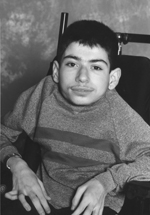
My name is Ali. I'm from Northern Iraq and I'm Kurdish. My family came to the U.S. in 1997 and right now we live in Lynnwood, Washington. I have Osteogenesis Imperfecta, which causes my bones to be brittle. I am starting the twelfth grade in high school this fall. I like science, engineering, computers, and math. I received an internship at the Boeing Company called Tech Prep; I'll be trained in engineering there this summer. I'll be graduating next year and I plan to go to a 4-year college or university. I hope to major in computer science or aerospace engineering.
DO-IT Ambassador Profile
by Amanda
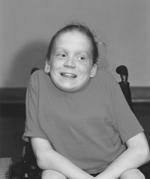
Hi, my name is Amanda. I joined the DO-IT program when I was a junior in high school. I am from Great Falls, Montana. After graduating from Great Falls High School in 1999, I attended the University of Great Falls. I am studying communications with an emphasis in writing. I am planning to minor in art with an emphasis in photography. The work is a little difficult, but I am doing well. My hobbies include reading, writing, and photography. My disability is paraplegia. My main diagnosis, however, is Campomelia Dysphasia. It means "curvature of the long bones." It is very rare. By using wheelchairs, both manual and powered, I am able to keep up with most everything.
AmandaJohn1@go.com
DO-IT Pal Profile
by Matthew
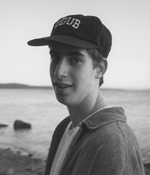
Hi. I attend Chrysalis High School in Woodinville, Washington and plan to graduate in 2002. I enjoy math, science and computers. At different times I've liked different academic subjects. Recently I've enjoyed my computer class the most. I'm most interested in exploring graphic design. I have experience in Web page design, including some animation. I am in the process of learning how to use voice recognition software. I became interested in being a DO-IT Pal (an electronic community supported by DO-IT staff and mentors) because I want to go to college. I also want to meet other students with similar interests and goals as well as gain advice from successful college students and adults with disabilities. Send e-mail to doit@u.washington.edu to learn more about DO-IT Pals.
DO-IT 2-4 Profile
by Kristina Courtwright
Hello, my name is Kristina Courtwright. I am a DO-IT Mentor. I enjoy reading, playing with my cat Sparrow, and talking with other people who have disabilities. I have Cerebral Palsy and other disabilities and use a wheelchair and/or canes to get around. I attended Tacoma Community College, and then transferred to the University of Puget Sound, where I completed my Bachelors degree in Occupational Therapy. I became interested in DO-IT when I heard about the DO-IT 2-4 project because, in my own experience, there were very few role models with disabilities that I could find, much less go to for advice. There were many times when I got very frustrated. I finally started keeping a mental list of people I could go to for help with problem-solving, and pep talks - that sort of thing. That seems to be a lot of what the doit24 electronic discussion list (doit24@u.washington.edu) does for people. In DO-IT 2-4 we focus on the transition from 2-year to 4-year schools for students with disabilities.
I became very interested in advocacy, mentoring and assistive technology during my schooling and two internships in Spokane. Ideally, I would like to work with children, teens, and/or young adults who have similar disabilities, because I think it is important to have role models and to share our experiences whenever we can. This fall I will be joining Americorps working with disadvantaged elementary school kids to improve their reading skills. Some of my friends think I am a bit loony for wanting to be a therapist, but I have learned a lot and had a lot of fun along the way. I have enjoyed being a part of DO-IT, and look forward to getting to know even more participants.
klcourtwright@juno.com
DO-IT CAREERS Profile
by Cynthia
My name is Cynthia. I am twenty years old and live in Seattle, Washington, where I am a freshman at the University of Washington. I have a disability called achondroplasia (dwarfism). I am twenty years old, but my height is only 4 feet. I have had this disability since the first second I entered this world. I was born and grew up in Vietnam. My family and I came to the United States in the summer of 1992.
When I was still in Vietnam, I thought I was the only one who had a disability in this world. I really hated my physical disability, because when I went out of the house the kids in my neighborhood would laugh at me, and sometimes even throw rocks. I would always ask myself, "How come I am the only one who is different from everyone?" I lived in Vietnam for twelve years, with the idea that disabled people are useless people. When I came to the U.S. I learned that there are many other people with disabilities and, of course, I am NOT a useless person.
In my first year of living in the U.S., I studied English. When I came to the U.S., they placed me in the sixth grade. During my second year in the U.S., my family and I moved to Seattle. Our life was difficult during these first few years, but I knew that it was just temporary as long as I did well in school. And now I was able to stand up and proudly announce to everyone that I was a "regular" person. During my two years of study at Denny Middle School, I received many different awards, like student of the month and honor roll. By the end of my eighth grade, I received the most honor awards of any student at the school.
When the summer began, all the other people my age seemed ready for their first year of high school. I didn't have any of those feelings. I felt nervous and scared because I was in the hospital to have surgery on my leg. It was the first time I ever had an operation. I got an infection following that first operation and missed the first quarter of my freshman year in high school. The next summer I had an operation on my other leg, so I didn't have a chance to participate in any programs. The summer of my sophomore year, I started to participate in DO-IT.
Before participating in DO-IT, I was not open to new experiences and did not believe in myself. Through DO-IT, I learned so much about life and myself. I have more confidence despite my disability, and I am more independent. I know what to do when I have problems; I know how to deal with my problems and other people's problems. I not only learned socially but I also learned academically. I also gained leadership skills. If you ask me, "What did you learn in DO-IT?," I can be proud and tell you that I learned everything. After participating in DO-IT, I am more open with the world.
During the summers, I try to participate in unique education programs. The summer of my junior year in high school, I went to the University of California, Santa Cruz to study about marine science. During the academic year I volunteer at hospitals and tutor other students in my school and neighborhood. All the participation and the awards I received happened because DO-IT gave me strength. DO-IT opened up my life and the world around me.
If you want to communicate with me, please feel free to contact me at cynle@u.washington.edu
DO-IT Mentor Profile
by Chaunce White
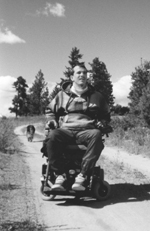
I have been affiliated with DO-IT since January 2000 as a Mentor, and I am a student. My name is Chaunce White, a quadriplegic of seven years. After having my world turned upside down due to a vehicle accident, I enrolled and rolled into school on my way to starting a new life. I have taken computer-related programs and have decided that they are an excellent tool but not a career path for me. I am in the process of re-evaluating my interests and skills as far as a career direction. The instructors I have dealt with have bent over backwards to assist me with whatever it takes to make my learning experience comfortable. I grew up in Pennsylvania and the Navy brought me to Whidbey Island. After being injured, I moved to Seattle, which is a very accessible city. Eventually, I will move to the southwest for the warmth. Being in a wheelchair has not slowed my traveling down. I am on the board of directors for the Northwest Paralyzed Veterans of America, and a speaker for Think First, speaking to high school students about prevention of spinal cord injury and head injury due to negligent and extreme behavior. My first physical encounter with DO-IT was the previous teleconferenced pizza party. I think the camaraderie I experienced with the young people was energizing. DO-IT provides communication for people with similar situations, which reduces isolation. It also provides a place to address questions-that eliminates barriers of not knowing where to go or what to do. I urge the students to extract all the information, support, advice, and direction they can acquire from DO-IT.
DO-IT Staff Profile
by Doug Hayman
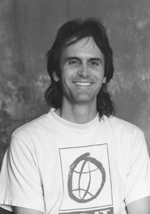
Hello. I'm an adaptive technology specialist for the Washington DO-IT program. I connect with new DO-IT Scholars, find out what types of hardware/software would be useful to them, get it for them and, then, support them in using that technology. This can sometimes involve a bit of trial and error, as there is no one set of solutions that meets everyone's needs. Instead, I have an ongoing relationship with each Scholar where his or her feedback and initiative is essential. This self-advocacy, paired with my enjoyment of seeking solutions, is key to finding suitable technological accommodations.
I also get to know Scholars outside of this technological relationship. We are primarily social beings and this technology we create is to serve us, rather than us being servants to it. I enjoy conversing about all sorts of topics. I've had a varied and sometimes interesting life with many unusual experiences to draw from.
In addition to this role at DO-IT, I am involved in projects to educate other organizations/institutions in the application of adaptive technology and accessibility thinking. When I'm not out on the road or in the DO-IT office, I can be found in the University of Washington's Adaptive Technology Lab.
Prior to working for DO-IT, I worked for a private adaptive technology consulting firm. There I not only played with computers, but I did a variety of creative things to serve clients from the Department of Vocational Rehabilitation and the Veteran's Administration. I've modified wheelchairs; installed ramps, grab bars, and other household/workplace modifications for accessibility; and I've created custom-made accessibility tools for end users. Each of these assignments served to make a workplace or educational training program accessible to persons with disabilities. Many of these "manufacturing" skills I learned while working at a Seattle-based manufacturer of folk harps and hammered dulcimers.
Outside of work I attempt to match the computer gaming skills of my technical co-horts Marvin and Dan, with little success. And I occasionally do musical performances in and around the Seattle area where I "noodle around" on guitar, accompanying other musicians. I read quite a bit and I'm striving to spend less time at home in front of a computer now that I spend so much time in front of one at work. It's more important to be in contact with real-world humans.